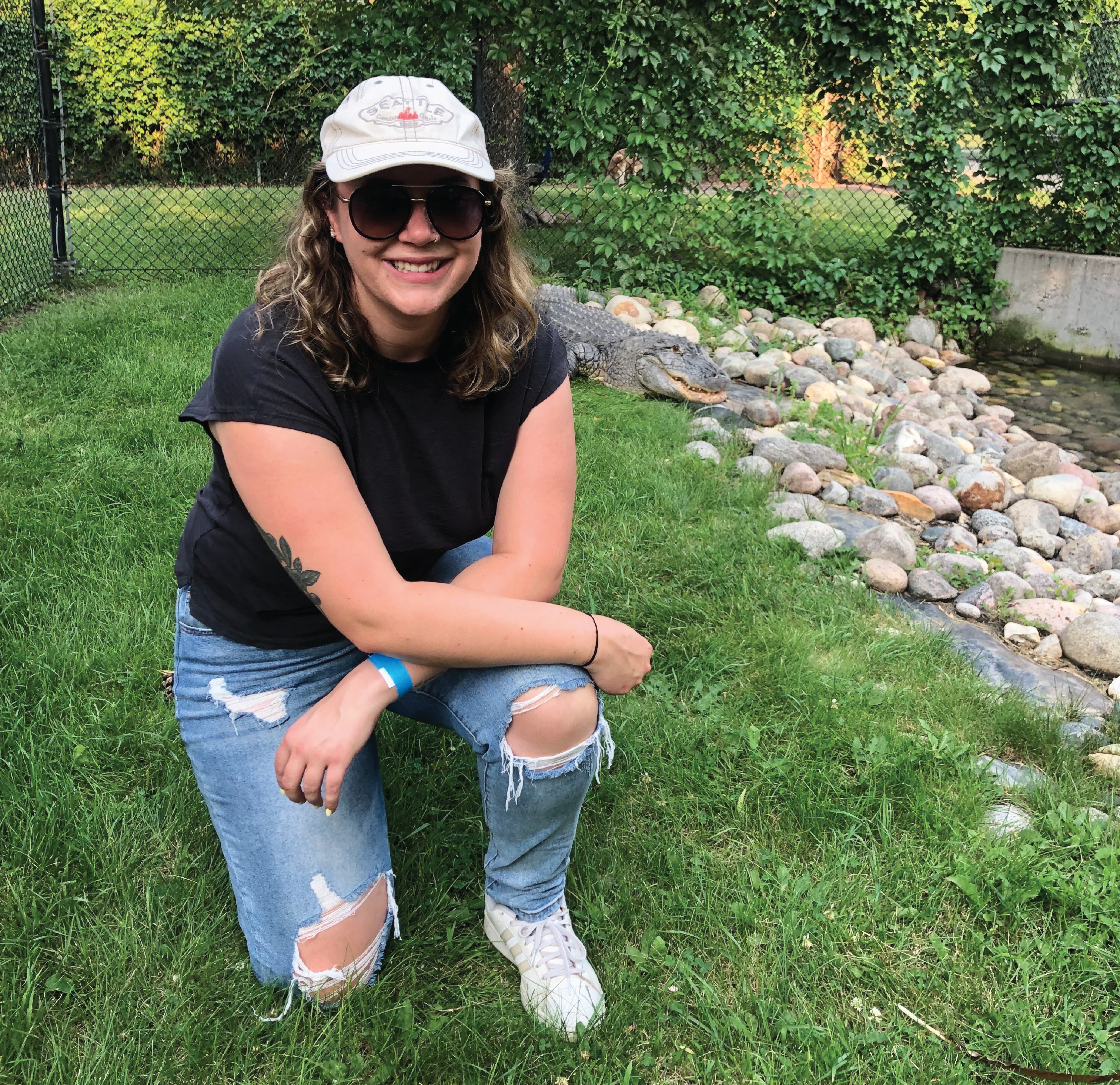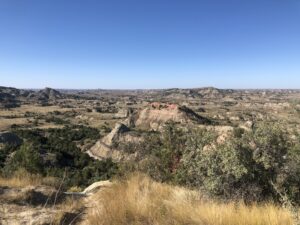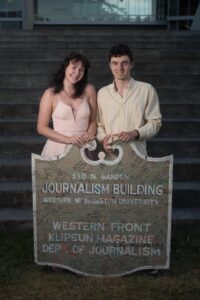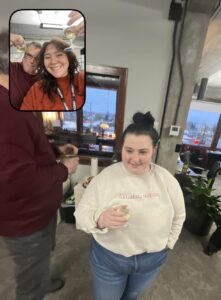Audra Anderson can’t get enough of the hyper-local news scene

Alumna works to meet the needs of her newsroom & readers
By Madisun Tobisch
When Audra Anderson’s friends have a question about the latest waterfront development or downtown eatery, they ask their personal, local news expert.
As the assistant editor at Cascadia Daily News, Anderson reads every piece of copy that comes through the never-ending news cycle. She said her sense of being “tuned in” to Bellingham’s beating heart is more heightened now than ever before as a student or local reporter.
Her few years of post-grad experience in newsrooms certainly didn’t hurt her efforts when she came to fulfill CDN’s mission of informing the area.
After graduating from Western Washington University in June 2020 as a news/editorial major, Anderson found work in the middle of the COVID-19 pandemic as a reporter and later assistant managing editor at the Wahpeton Daily News in North Dakota. She spent a year and a half embedded and isolated in a rural town with a smaller scope of news but a workload that prepared her for the fast-paced environment at CDN.

During Anderson’s time as a reporter at The Western Front, former editor Ian Haupt said it didn’t take long for the editorial staff to recognize her talent.
“All the editors were kind of like, ‘We’re gonna give her the big stories, and we’re gonna kind of rely on her throughout the quarter,'” Haupt said.
Anderson remembers her academic journey as backward and turbulent. Two years into what began as a chemistry major, she couldn’t see herself working in a sterile, gray research facility after finishing school. However, with a four-year degree, it seemed her likely trajectory. Anderson decided to change course.
“I just decided to kind of say, ‘screw it,'” she said.
She had to tell her STEM-oriented family she was switching to a journalism degree, which seemed more palatable than her other backup plan — creative writing.
Anderson fit the journalism major into two years. Given the limitations put on education by the pandemic, she graduated without an internship opportunity, which she said factored into job availability on top of an already constricting market.
“I hit the ground running because I knew I couldn’t afford to do more than four years of college, but I really was motivated to do journalism and prove to myself and my family that this was the right choice for me,” she said.
Edging on desperation after feeling dejected by hiring ads looking for two or more years of newsroom experience, Anderson found herself in Wahpeton, at the first publication to send her an offer.
Career-wise, her time in Wahpeton was a useful stepping-stone to where she is now. Experience-wise, she’s happy to be back in the Pacific Northwest.
Growing up in the small, desert town of Vail, Arizona, Anderson was floored by a pamphlet in the mail showing off Western’s lush greenery and waterfront access. It was a stark but welcomed difference from the dry expanses of desert valley and cacti she grew up with. She took a campus tour of Western during her junior year of high school, sealing the deal in her mind.
“I just wanted the trees and the ocean and everything,” she said.
There were plenty of people in the PNW happy to have her back. Haupt has kept up with Anderson’s work since she started at CDN, a half hour or so from his reporting office in Blaine at The Northern Light.
“It was cool to see her come back. And what they’re doing is pretty cool.”
While at Western, Anderson was editor-in-chief of both The Western Front and Klipsun Magazine.
It’s tradition for the EIC of The Front to hand-pick their managing editor and second-in-command for the quarter. Haupt said he wouldn’t have taken the job if anyone besides Anderson had offered it.

Despite feeling reluctant going in, he now feels part of his self-confidence as a journalist is owed to Anderson.
“If I hadn’t done it, I don’t think I would probably be as confident as I am in the job I have today,” he said.
Throughout fall 2019 they lead the paper together. Haupt saw weekly improvements in the paper, the staff and in Anderson’s capabilities as a leader. Their quarter, laid the foundation for creating a lasting online presence which eventually would be the direction the publication would take less than a year later.
They were ambitious in their goals for the paper and for themselves. Anderson and Haupt both remember discussing Anderson’s dreams of working for a national publication or as a foreign correspondent.
Now, her sights are set on filling the need for local news. She thinks she’ll stick around CDN for a while. She laughed, thinking back on the many titles she’s held there in her little more than a year back in Washington.
“It’s been a lot of changes over the whole time that I’ve been here, which is fine,” she said. “I am the type of person to roll with the punches, and I like editing pretty equally to reporting.”
Originally hired as a news producer, Anderson stepped up to fill the publication’s needs as it found its footing — launching in January 2022, only months before bringing her on.
Since then, she’s been assignment editor, enterprise reporter and now, as of April 2023, assistant editor. Anderson said despite the range of titles, the work has plenty of overlap. As enterprise reporter, she had the most reporting opportunity to uplift stakeholder voices within her community through series like Women Empowered and Child Care-less.
“I love this newspaper, and I want to do whatever role I fit in best at the time that I’m needed,” she said.

Anderson would follow story tips based on community members who called to voice their concerns about what they saw in their neighborhoods. In her new position, when tips come her way, she checks them out and sends them to the desk of a fellow capable journalist.
“When the people that are actually most affected or who are experiencing it are really emotional and passionate about it, that makes me feel very passionate about the story and getting the story out there,” Anderson said.
As assistant editor, she helps guide the “greener” interns through their story structure and writing craft while learning from her fellow staffers, all of whom she said offer an individual wealth of knowledge and experiences.
With a now-established career, Anderson said her family back in Arizona is proud and can appreciate the work she does as a journalist.
She’s enjoyed getting reacquainted with the city and region she knew she decided to call home — this time through a journalist’s lens. She said Bellingham is a caring community with good intentions — for the most part.
The last year has been gratifying for Anderson to see CDN’s hard work paying off in the form of a trusting readership.
“It can be dicey to start a new organization and try to ask people to put their trust and their faith in what you’re writing, and so it’s been exciting to feel like we are getting that from the public,” Anderson said. “People do look to us as a resource, and that’s all we could really ask for. I hope we just continue to be able to grow and do more.”
